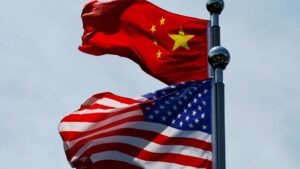Understanding the Implications of China’s New Tariffs on U.S. Goods: What You Need to Know
At Extreme Investor Network, we pride ourselves on providing our readers with in-depth analysis and unique insights into the ever-evolving landscape of global economics. Today, we’re diving into the recent developments in U.S.-China trade relations that could reshape market dynamics.
The Latest Developments from China
On April 10, China’s Finance Ministry made a definitive move by imposing a staggering 34% tariff on all goods imported from the United States. This decision comes on the heels of tariffs implemented by the Trump administration, effectively raising total tariffs on U.S. goods to 54%. The implications of these tariffs are significant, affecting not only the businesses and consumers in both countries but also the global economy at large.
China’s officials have urged the U.S. to retract its unilateral tariffs and resume trade discussions that are equitable and beneficial for both parties. Echoing their sentiments, a spokesperson from the Finance Ministry criticized the U.S. tariffs as "inconsistent with international trade rules," warning that these actions could undermine global economic development and stability in supply chains.
The Wider Impact on U.S.-China Relations
In a simultaneous move, China has expanded its "unreliable entities list," which now includes 11 U.S. firms that are accused of breaching market rules. This action reflects the growing tension between the two superpowers, with extensive implications for companies engaged in international trade.
China’s Ministry of Commerce has gone a step further by adding 16 U.S. entities to its export control list and announcing pending export controls on seven types of rare earth materials critical to various industries. This could directly affect tech companies and manufacturers that depend on these materials for production.
Moreover, Beijing has lodged a formal complaint against the U.S. with the World Trade Organization (WTO). This legal maneuver not only highlights China’s commitment to challenging the tariffs on global platforms but also signals a pivot toward a more confrontational trade posture.
Economic Ramifications
The trade friction is poised to affect a staggering $582.4 billion trade relationship projected for 2024. Analysts are indicating that the U.S.’s protectionist approach may prompt China to pivot toward alternative trading partners, while simultaneously bolstering internal stimulus measures aimed at revitalizing its economy—a crucial necessity given the ongoing property crisis and lackluster consumer sentiment in a post-COVID world.
At Extreme Investor Network, we believe that these developments are a critical moment for investors and businesses alike. The fluctuations in tariffs will not only alter pricing markets but could also lead to long-term shifts in trade alliances. The immediate economic repercussions could manifest as higher prices on consumer goods, reduced access to rare materials, and overall instability in global markets.
A Global Perspective
While many nations are hesitating on retaliatory tariffs, the European Union has signaled its readiness to respond, indicating a wider geopolitical landscape where many countries are forced to navigate the ripples caused by U.S.-China tensions.
As the situation unfolds, we remain vigilant at Extreme Investor Network to provide our readers with timely analysis. Understanding these tariff implications not only prepares businesses and investors for changes in trade but also illuminates broader economic trends—guiding informed decisions.
Conclusion
In conclusion, the new tariff implementations have sparked a chain reaction that could reshape the global trade environment. As always, we encourage our readers to stay informed and analyze these developments critically. At Extreme Investor Network, we’re committed to delivering insightful analysis and unique perspectives that help you navigate the complexities of today’s economy. Stay tuned for more updates and analyses that put you ahead in investment strategy!

